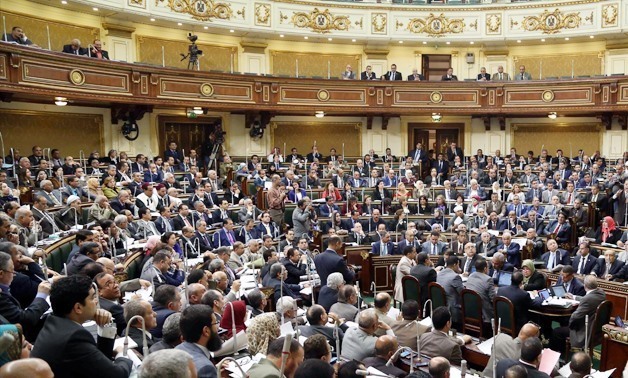
FILE – Parliament
CAIRO - 11 June 2018: The preliminary estimates of electronic advertisements’ yields on Google, Facebook and other various platforms in the Egyptian market will not be less than LE 1 billion annually, according to Head of Egyptian Tax Authority Emad Samy Hussein.
Hussein affirmed that advertisements on websites, social networks and digital platforms are now subjected to the law of value added tax (VAT); accordingly, a VAT of 14 percent will be applied on such advertisements.
In 2016, the Parliament approved a law introducing a value-added tax of 13 percent, raised to 14 percent in July 2017, as a part of the government’s plan to reform the economy and cut its deficit.
Hussein added that the authority is studying to apply the taxes retroactively since September 2016.
Regarding the tax collection mechanism, the head of Tax Authority said that a study on this issue is currently being developed, stipulating that these social networks and search engines need to have offices in Egypt to be taxed.
Most of the world’s countries impose taxes on ads of search engines and social networks, including Google, Facebook and other various electronic platforms, Hussein said, adding that Egypt joins these countries in subjecting the platforms to taxes in order to reach the best international practice in this regard.
As per Tax revenues, he said that about LE 604 billion are expected to be collected during the fiscal year 2017/2018, to reach around LE 776 billion in 2018/2019.
The Egyptian Parliament approved a law to impose taxes on advertisements of electronic platforms, including Google and Facebook.
The Parliament passed the chapter two on "practicing the media institution for its activities" in the draft law regulating the press and media. One of the chapter’s articles reads that it is not permissible for a website to bring advertisements from the Egyptian market if it is not subscribed in the Supreme Council and subject to the provisions of Law No. 11 of 1991 on tax evasion.
Article 59 of the draft law stipulates that no media outlet or website shall be established or operated, prior to obtaining a license from the Supreme Council.
Hussein considered the Parliament’s decision to be an important step on the right track.
Moreover, Deputy of Minister of Finance Mohamed Maait welcomed the new law, saying it’s an important step which helps in maximizing Egypt’s tax revenues.
In the upcoming budget of 2018/2019, revenues are projected to reach a total of LE 989.2 billion, in which taxes and tariff yields allocate to contribute LE 770.3 billion to the new budget’s revenues, up from LE 624.20 billion in the current fiscal year.
The Central Agency of Mobilization and Statistics (CAPMAS) stated earlier that state revenues in the second half (H2) of the current fiscal year (2017/18) stood at LE 302.5 billion, of which LE 249 billion are tax revenues.
The data revealed that tax revenues, which include income tax and other forms of taxes, captured 82.3 percent from the total revenues in H2 of the fiscal year. Other sources of revenues constituted 17.7 percent.
Finance Minister Amr el-Garhy said in April that his ministry targets to increase taxes to 17-18 percent of GDP, up from the current 14 percent.

Comments
Leave a Comment